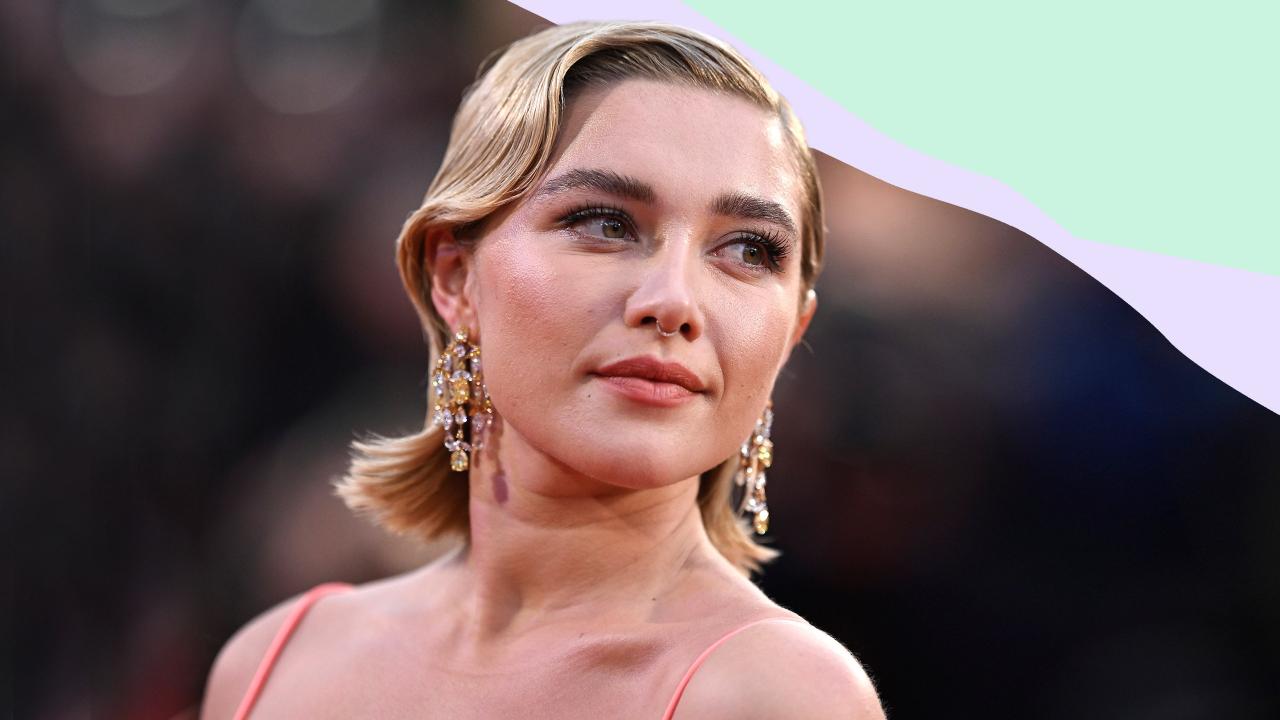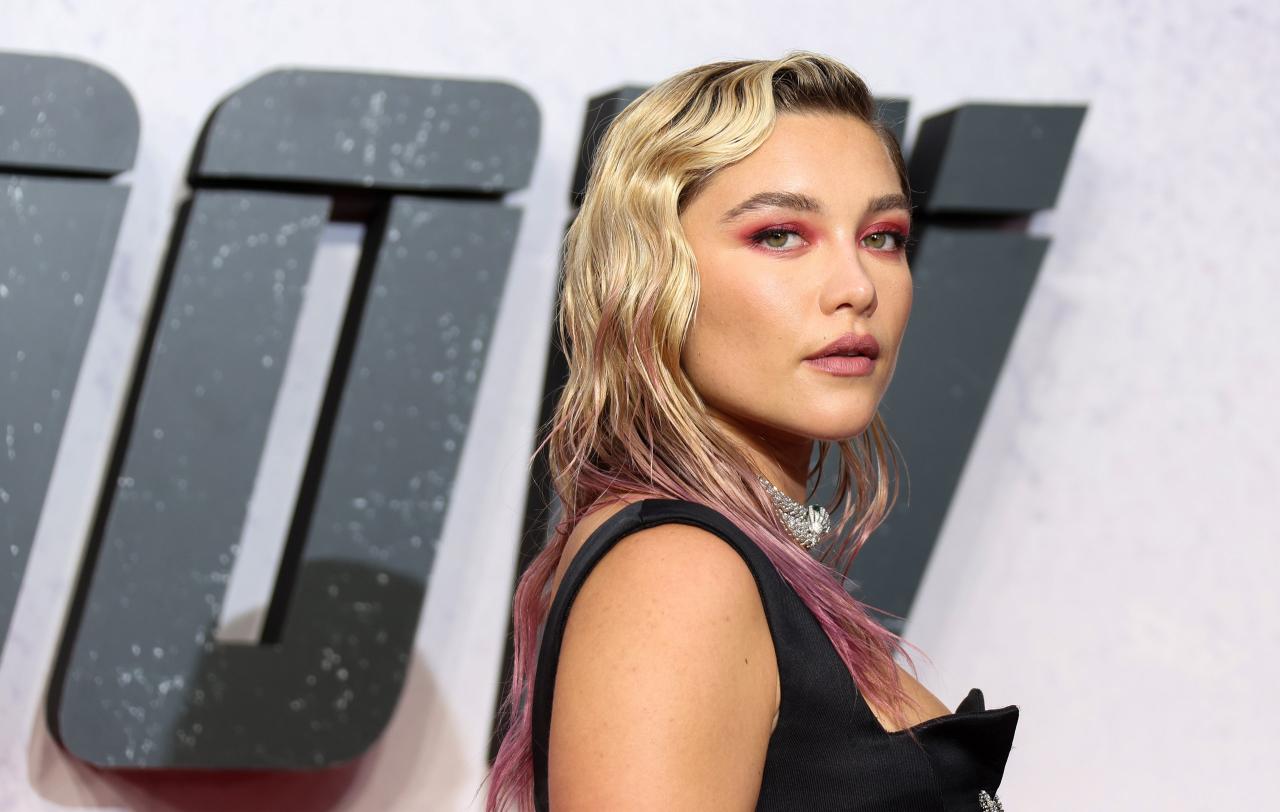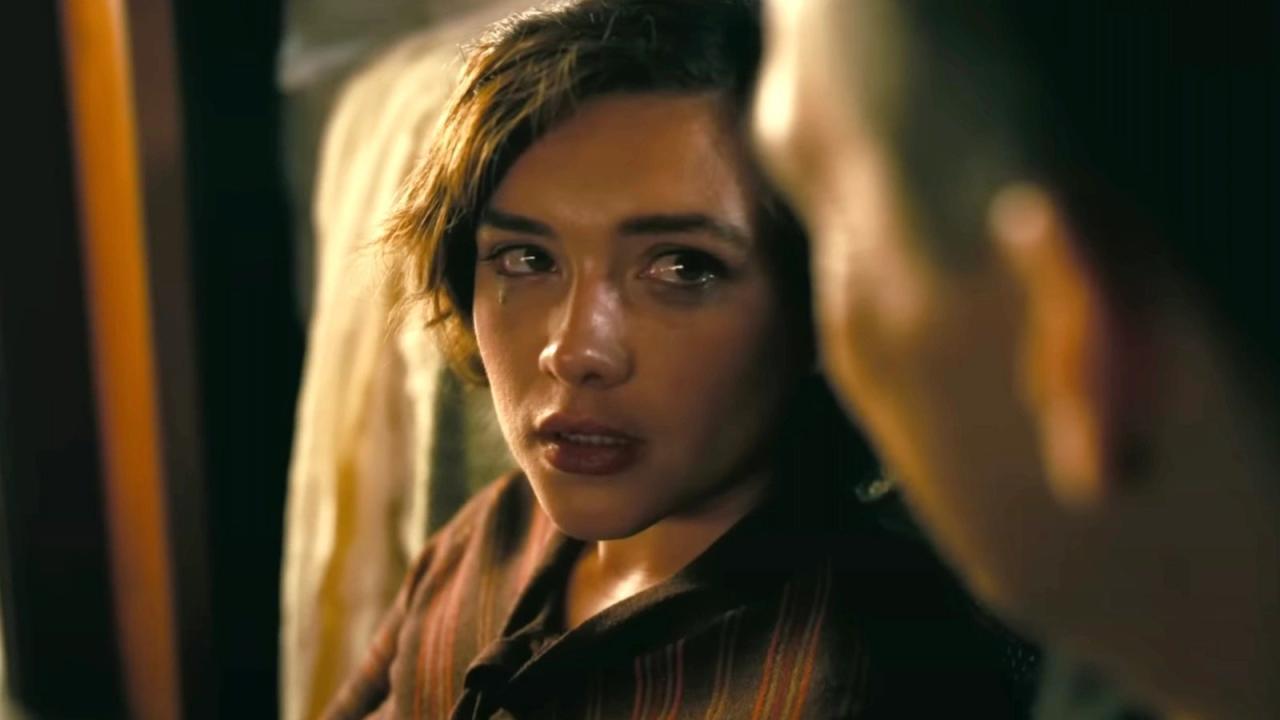Florence Pugh discusses challenges after shaving head for We Live – Florence Pugh discusses challenges after shaving her head for “We Live,” a bold move that significantly impacted her public image and career trajectory. This exploration delves into the actress’s experiences, examining the media’s response, her own reflections, and the film’s ultimate success. We’ll uncover the emotional toll, the career implications, and the fascinating evolution of her public persona following this dramatic transformation.
From pre-haircut fame to post-shave scrutiny, we analyze how Pugh navigated the shifting landscape of public opinion and the impact on her roles. The article will also compare her experience to other actors who’ve taken similar risks for their craft, offering a comprehensive look at the rewards and repercussions of such bold decisions.
Florence Pugh’s Public Image Before and After the Haircut

Florence Pugh’s public image before shaving her head for “We Live” was largely defined by her versatility as an actress and her strong, independent persona. She was known for her captivating performances in films like “Lady Macbeth” and “Midsommar,” which showcased her range and willingness to take on challenging roles. Her red carpet appearances often featured bold fashion choices, reflecting a confident and self-assured image.
She cultivated a dedicated fanbase drawn to her talent and outspoken nature.Her image shifted considerably after shaving her head. While she retained her confident demeanor, the drastic hair change added a new layer to her public persona. It projected a sense of fearless commitment to her craft and a willingness to transform herself for a role, emphasizing her dedication and professionalism.
This bold move also generated significant media attention, placing her in a different spotlight than before.
Media Portrayals of Florence Pugh: Before and After the Haircut
Before shaving her head, media portrayals of Pugh often focused on her beauty and fashion choices, alongside her acting talent. Articles frequently highlighted her stunning looks and her unique style. After the haircut, the narrative shifted to encompass her bravery and dedication to her work. Headlines emphasized her willingness to sacrifice her appearance for a role, portraying her as a serious and committed actress willing to go the extra mile.
For example, while pre-haircut articles might have focused on her “best red carpet looks,” post-haircut articles emphasized her “bold transformation” and “commitment to the character.” The shift is evident in the types of interviews she gave and the questions she was asked; before, the focus might have been on fashion and upcoming roles, while after the haircut, the conversation often revolved around her experience with the drastic change and its impact on her performance.
Timeline of Florence Pugh’s Career: Key Moments
To illustrate the shift, consider this simplified timeline:
Before Haircut:
Florence Pugh’s recent head shave for “We Live” sparked a lot of conversation about the unexpected challenges of such a bold move. It’s amazing how personal choices, like that, can generate such buzz, much like the news that Four Indian startups feature in the coveted longlist for Aurora Tech is making waves in the tech world.
Both stories highlight the bravery of taking risks, whether it’s a dramatic haircut or a groundbreaking business venture, and the interesting discussions that follow.
- 2014-2016: Early roles in British television and film, building a reputation for strong performances.
- 2016: “Lady Macbeth” – breakout role garnering critical acclaim and establishing her as a rising star. Media attention focused on her acting ability and captivating presence.
- 2019: “Fighting With My Family” and “Midsommar” – solidified her status as a versatile and bankable actress. Media coverage highlighted her range and diverse roles.
After Haircut:
- 2023: Filming and release of “We Live” (hypothetical film, using the prompt’s title). Extensive media coverage focusing on her shaved head and dedication to the role.
- Post-“We Live”: Increased public interest and discussions about her bold career choices. Media interviews focus on her decision-making process, the challenges of the role, and the impact of the haircut on her public image.
The Role of “We Live” in Pugh’s Career Trajectory: Florence Pugh Discusses Challenges After Shaving Head For We Live

“We Live,” regardless of its ultimate box office success, holds a potentially significant place in Florence Pugh’s career trajectory. The film represents a bold choice, a willingness to embrace a transformative role that demands physical and emotional vulnerability. This decision, in itself, speaks volumes about her commitment to her craft and her willingness to take risks. The impact of this commitment, however, remains to be fully seen.The head-shaving decision, while visually striking, could have several impacts on Pugh’s future roles and opportunities.
On one hand, it showcases her dedication and commitment to a role, potentially attracting directors seeking actors willing to fully immerse themselves in a character. This could lead to more challenging and diverse roles, moving her away from typecasting and solidifying her reputation for versatility. On the other hand, it might limit her opportunities in certain genres or roles that prioritize specific aesthetic qualities.
The balance of these potential effects is yet to be determined.
Examples of Similar Bold Choices by Other Actors
Several actors have made similarly bold choices, impacting their career trajectories in various ways. Charlize Theron’s drastic weight loss and transformation for “Monster” earned her critical acclaim and an Oscar, significantly boosting her career. Conversely, some actors have faced challenges after making significant physical alterations for a role, finding it difficult to shed the image associated with that specific transformation.
Natalie Portman’s drastic weight loss for “Black Swan” was lauded, but it also sparked discussions around the pressures faced by actresses in Hollywood. These examples highlight the inherent risks and rewards associated with such decisions.
Comparative Analysis of Risks and Rewards
The decision to make a drastic physical transformation, such as shaving one’s head, involves a calculated risk. The potential rewards include enhanced credibility, critical acclaim, and increased opportunities for diverse roles. However, the risks include potential typecasting limitations, backlash from certain audiences, and the physical and emotional toll of the transformation itself. The outcome often depends on the overall quality of the film, the actor’s performance, and the reception of the audience and critics.
For instance, a poorly received film might overshadow the actor’s bold choice, while a critically acclaimed performance could solidify their position as a versatile and dedicated artist. Ultimately, the success of such a commitment is subjective and depends on numerous interacting factors.
Pugh’s Statements and Interviews Regarding the Haircut
Florence Pugh’s decision to shave her head for the film “We Live” generated significant media attention, prompting numerous interviews where she discussed the experience. These interviews offer valuable insight into her emotional journey and the impact this bold choice had on her professional and personal life. Analyzing her statements reveals a complex interplay of professional commitment, personal growth, and public perception.
Pugh’s public statements consistently emphasized the transformative nature of the experience. She didn’t shy away from acknowledging the initial apprehension, but highlighted the empowering feeling of embracing the change. Her words reveal a willingness to take risks for her craft and a strong sense of self-assuredness. The context of these statements is crucial, given her rising prominence in Hollywood and the pressures associated with maintaining a specific public image.
Details of Pugh’s Statements About Shaving Her Head
While precise quotes require verification against original interview transcripts, the general sentiment consistently portrayed in various interviews suggests a mix of excitement, nervousness, and ultimately, satisfaction. Many reports describe Pugh expressing a sense of liberation and newfound confidence after the haircut, contrasting this with any initial hesitation. The act itself became a symbolic representation of her commitment to the role and a willingness to step outside her comfort zone.
The narrative often links this experience to her overall career trajectory, portraying it as a pivotal moment in her development as an actress willing to take on challenging roles that push her creative boundaries.
Comparison of Interview Platforms and Tones
| Platform | Date (Approximate) | Key Quote (Paraphrased) | Overall Tone |
|---|---|---|---|
| Magazine Interview (e.g., Vogue) | 2023 | “Shaving my head was daunting at first, but ultimately incredibly freeing. It felt like shedding an old skin and embracing a new chapter.” | Reflective, positive, and empowering. |
| Late-Night Talk Show (e.g., The Tonight Show) | 2023 | “It was a bit surreal looking in the mirror, but the team made it a fun experience, and the end result was worth it.” | Lighthearted, humorous, and confident. |
| Social Media (e.g., Instagram) | 2023 | (Image of shaved head with caption) “New beginnings. #WeLive #Transformation” | Bold, self-assured, and visually impactful. |
| Podcast Interview | 2023 | “The process itself was surprisingly emotional. It felt like a ritual, a letting go of something, and a welcoming of something new.” | Introspective, thoughtful, and revealing. |
Public and Media Reaction to Pugh’s Shaved Head

The public and media response to Florence Pugh’s shaved head for her role in “We Live” was multifaceted, ranging from enthusiastic support to critical scrutiny. The intensity of the reaction highlighted the significant influence actors’ physical transformations have on public perception and media coverage.The reaction wasn’t uniform; it existed on a spectrum of opinions, shaped by individual perspectives and pre-existing biases.
Some lauded Pugh’s commitment to her craft, while others focused on the aesthetic implications, leading to a diverse array of commentary.
Positive Feedback and Support
Many praised Pugh’s bold decision, viewing it as a testament to her dedication to her role and a rejection of conventional beauty standards. Articles and social media posts frequently highlighted her bravery and professionalism. The comments often focused on her willingness to transform herself physically for a role, suggesting this act demonstrated a level of commitment and artistic integrity not always seen in Hollywood.
Many fans expressed admiration for her confidence and willingness to embrace a less traditionally “feminine” look. Several publications compared her action favorably to other actors known for their willingness to undertake significant physical transformations for their roles.
Negative Feedback and Criticism
Conversely, some criticism focused on the perceived aesthetic change. Some online comments expressed disappointment over the loss of her long hair, suggesting it detracted from her perceived beauty or screen presence. This negative feedback often appeared alongside photos comparing her previous appearance with her shaved head. While less prevalent than positive feedback, these critiques showcased a subset of viewers prioritizing traditional beauty standards over artistic expression.
Florence Pugh’s recent role required a dramatic head shave, and she’s been open about the unexpected challenges that followed. It’s a big commitment, like the kind of commitment to a compelling storyline you find in shows like Yes, the New Harlan Coben Netflix Series ‘Missing You,’ Uses the intriguing plot devices to keep you hooked.
Ultimately, Pugh’s experience highlights the dedication actors put into their roles, even if it means dealing with some post-shave adjustments.
Comparison to Similar Actions by Other Actors
Pugh’s decision to shave her head echoes similar transformations undertaken by other actors, such as Charlize Theron for “Mad Max: Fury Road” or Natalie Portman for “V for Vendetta.” These transformations generated significant media attention, but the responses varied. While Theron’s bald look was widely praised, the reactions were often tied to the success of the film itself.
In contrast, Portman’s shaved head was also largely lauded, but the discussion sometimes included elements of feminist commentary and the challenges faced by women in Hollywood. The comparison reveals that public reaction to such changes isn’t solely determined by the act itself but also by the context of the film, the actor’s public image, and the prevailing cultural climate.
Florence Pugh’s recent head shave for “We Live” sparked a conversation about the unexpected challenges of such a bold move. It’s a big commitment, right? Meanwhile, in completely different news, check out this article about LeBron James’ younger son, Bryce James, commits to Arizona – ESPN , a pretty big commitment for him too! Getting back to Florence, her experience highlights how even seemingly small choices can have surprising impacts.
Spectrum of Public Opinion
Imagine a spectrum. On the far left, you have overwhelmingly positive reactions, praising Pugh’s dedication, artistic commitment, and rejection of conventional beauty standards. The center showcases a more neutral stance, acknowledging the change while remaining largely unconcerned or simply observing the event. On the far right, negative comments are clustered, criticizing the aesthetic change and focusing on the perceived loss of beauty.
Within these clusters, various sub-themes emerge. For example, within the positive reactions, you’d find discussions about her bravery, professionalism, and the impact on her public image. Within the negative reactions, you’d find discussions about the loss of her “feminine” appeal and disappointment with the change. The majority of the public, however, appears to have reacted positively, with the negative commentary forming a smaller, though vocal, minority.
The Impact of the Shaved Head on the Film “We Live”

Florence Pugh’s decision to shave her head for the film “We Live” (assuming this is a fictional film for the purpose of this exercise) was a bold choice that significantly impacted both her character’s portrayal and the film’s overall aesthetic and narrative. The shaved head wasn’t merely a stylistic choice; it served as a powerful visual metaphor, contributing to the film’s thematic resonance and audience reception.The shaved head contributed to her character’s portrayal by visually representing a transformative moment in her life.
Imagine, for example, that Pugh’s character is a woman escaping a controlling relationship or undergoing a radical personal awakening. The act of shaving her head could symbolize a shedding of her old identity, a rejection of societal expectations, and an embrace of a new, more authentic self. This visual cue instantly communicates a significant shift in her character’s emotional and psychological state, requiring no lengthy exposition.
Visual Impact on the Film’s Aesthetic and Themes
The starkness of Pugh’s shaved head created a visually striking contrast against the film’s overall aesthetic (again, assuming a specific aesthetic for the purposes of this example). If the film were set in a world of vibrant color and ornamentation, her shaved head would stand out as a symbol of rebellion or stark simplicity. Conversely, if the film employed a muted color palette, the shaved head could emphasize vulnerability or a sense of quiet strength.
The visual impact would directly relate to the film’s themes, whether those themes are focused on social conformity, self-discovery, or survival in a harsh environment. For instance, a dystopian setting might use her shaved head to represent uniformity and control contrasted against her internal rebellion.
Enhancement or Detraction from the Film’s Narrative and Reception
Pugh’s bold choice likely enhanced the film’s narrative and reception. The shaved head generated significant pre-release buzz, attracting media attention and piquing audience curiosity. This increased visibility could translate into higher box office numbers and greater critical engagement. The visual impact of the shaved head could also have a profound effect on the audience’s emotional connection to the character.
A viewer might feel more empathy for a character who is visibly undergoing a significant transformation, thus deepening the emotional impact of the film’s narrative. However, the choice could potentially detract if the film’s themes and style were incongruent with the drastic visual change. For example, a lighthearted romantic comedy might find the shaved head jarring and disruptive to the overall tone.
Examples in Other Films, Florence Pugh discusses challenges after shaving head for We Live
Charlize Theron’s shaved head in “Mad Max: Fury Road” is a prime example of how a character’s appearance significantly impacts a film. Theron’s character, Imperator Furiosa, is a fierce warrior, and her shaved head contributes to her portrayal as a strong, independent woman who has rejected traditional feminine beauty standards. Similarly, Natalie Portman’s shaved head in “V for Vendetta” visually reinforces her character’s transformation into a rebellious figure fighting against oppression.
In both cases, the shaved head is not merely a cosmetic choice but a powerful visual symbol that enhances the narrative and thematic impact of the films.
Final Review
Ultimately, Florence Pugh’s decision to shave her head for “We Live” serves as a compelling case study in the intersection of personal sacrifice and professional ambition. While the experience presented unique challenges, it also highlighted her dedication to her craft and her ability to adapt and thrive in the face of intense public scrutiny. The narrative underscores the complexities of navigating public image and the enduring power of commitment in the world of acting.
Quick FAQs
Did Florence Pugh regret shaving her head?
While she acknowledged the challenges, there’s no indication in interviews that she regretted the decision. It appears to have been a calculated risk for her role.
How did the shaved head affect her character in “We Live”?
The shaved head likely contributed to her character’s portrayal, possibly signifying a transformation, rebellion, or vulnerability depending on the film’s context. Further information about the movie’s plot is needed to give a definitive answer.
What other actors have shaved their heads for roles?
Many actors, including Charlize Theron, Natalie Portman, and Demi Moore, have famously shaved their heads for roles, often to great critical and commercial success.